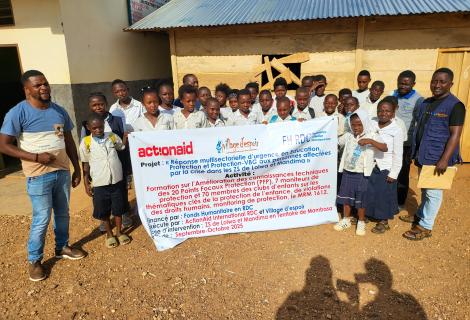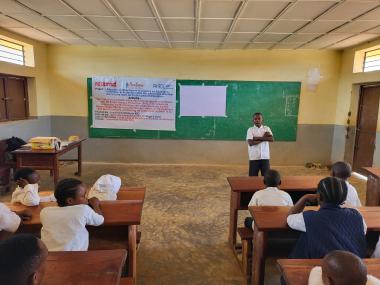Training of supervisors and members of children's clubs in the schools of Lolwa and Mandima

91 students and educators equipped with technical skills, including MRM 1612 protocols, to monitor and report grave human rights violations against children.
The humanitarian situation in Ituri remains profoundly concerning. Since 2023, the province has faced a devastating resurgence of violence that has claimed over 7,000 lives and displaced more than one million people since January 2025. This instability has a catastrophic impact on children, with over 100,000 currently denied quality education and an alarming increase in human rights violations. In response, ActionAid DRC, through its Multi-sectoral Emergency Response Project, organized a critical one-day training on October 13, 2025, targeting the very actors essential for child safety: 91 student club members, adult facilitators, and protection focal points in the Lolwa and Mandima Health Zones. This activity is a strategic step toward equipping a community-led defense system, focused on monitoring, documenting, and preventing grave risks like child recruitment, family separation, and Gender-Based Violence (GBV).

Activating School-Based Protection Networks - Reinforcing Protection Actors in Schools
The overarching goal of the October 13th training was to transform school clubs into active protection hubs. The activity directly targeted 91 participants (including 50 men and 41 women/girls), comprising student club members, adult facilitators, and 20 dedicated Protection Focal Points. Their training focused on improving child protection within the schools and strengthening the overall functionality of the clubs as protection mechanisms.
The curriculum equipped participants with essential technical competencies to face the severe risks present in the region:
- Detailed instruction on identifying, documenting, and reporting various forms of human rights violations.
- Comprehensive training on protection monitoring and the specific MRM 1612 (Monitoring and Reporting Mechanism), essential for reporting grave abuses against children.
- Practical knowledge to help prevent specific risks, notably child recruitment, family separation, and other severe abuses of children's rights.
Promoting a Participatory, Community-Based Approach
This initiative was designed to establish a lasting, community-owned protection framework, recognizing that local actors are the first responders. By training this group, the project aimed to:
- Empower participants to become the eyes and ears of their communities, capable of identifying, documenting, and accurately reporting protection incidents to relevant authorities.
- Enable the clubs to actively raise awareness among families and schools regarding the prevention of Gender-Based Violence (GBV) risks and promoting peace and social cohesion.
A Key Step Towards Durable Resilience
Through this integrated protection training, ActionAid DRC is effectively reinforcing community resilience by placing children, teachers, and local leaders at the very core of the protection mechanisms. This participatory approach is vital for creating a safer and more inclusive school environment, directly contributing to the consolidation of peace and social cohesion in a region long strained by persistent conflict.